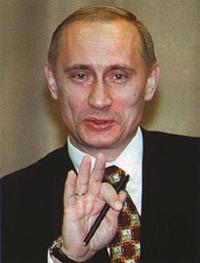Vladimir Putin declares Russia's talks with Iran to be anything but simple
Talks with Iran on a Russian proposal aimed at resolving an international crisis over Tehran 's suspected nuclear weapons program are not going easily, President Vladimir Putin said Wednesday.

"The talks are not going easily but we are counting on reaching a positive result," Putin told journalists on a visit to Azerbaijan .
The Russian leader said that the Kremlin's offer to enrich uranium for Tehran to avert suspicions that the Iranians could divert the nuclear fuel for atomic weapons should be "perfectly acceptable" to Iran and could be used as "a means to solve the problem."
"We are not losing optimism," said Putin. "We are waiting for a final response from the Iranian negotiators and we hope for a positive result."
The two countries' negotiators on Tuesday completed two days of inconclusive talks in Moscow on the Russian initiative, which comes amid Western pressure to impose sanctions against Iran .
Russian newspapers on Wednesday cited Iranian officials as saying that Iran was not ready to accept Russia 's plan because Tehran insisted on the right to conduct its own enrichment activities.
"There are no reasons at this stage to resume dialogue," the Vedomosti daily quoted an unidentified official close to the Iranian delegation as saying.
The Iranian Embassy in Moscow declined to comment on the outcome of the talks.
Tehran 's top negotiator, Ali Hosseinitash, labeled the Moscow meeting "positive and constructive," but some Russians voiced concern that Iran was using the proposed Kremlin compromise to stall for time and avert international sanctions.
The Russian proposal, backed by the United States and the European Union, is seen as the final opportunity to ease international concerns over Iran 's suspected nuclear weapons drive. Tehran has rejected calls to resume a freeze on domestic uranium enrichment.
The U.N. nuclear watchdog, the International Atomic Energy Agency, holds a March 6 meeting that could start a process leading to punishment by the U.N. Security Council, which has the authority to impose sanctions on Iran .
An Iranian diplomat cited by the Vremya Novostei daily said Iran wanted Russia to produce large-scale enriched uranium for it but needed a domestic uranium enrichment program to create "the basis for independence in the nuclear sphere." The diplomat also was not identified.
The Iranian official cited by Vedomosti said that at the talks, Iran demanded that the Russian enrichment plan function for only three to five years and insisted on the Iranian right to conduct the initial stages of uranium enrichment on its own territory.
But the Russian side, the official said, was adamant that the Iranians restore the freeze on enrichment they broke last month when they resumed small-scale activities, and that Iran content itself with paying Russia for supplies of enriched fuel for its atomic power facilities.
The Interfax news agency on Wednesday cited an unidentified diplomat in Moscow close to the negotiations as saying that the two sides had reached a deadlock, describing the Russian demand for a freeze on enrichment as "unacceptable" for Iran .
Russia's atomic agency chief, Sergei Kiriyenko, who is to visit Iran Thursday for further talks, said after the Moscow round of negotiations that Russia would do everything to help Iran resolve the nuclear dispute. However, a nuclear agency official familiar the talks said Thursday that Russia was expecting little from the Thursday talks. The official spoke on condition of not being identified further.
Russia , which has strong economic ties to Iran , is building the theocracy's first nuclear power station and is anxious to avoid sanctions and eager to win prestige by helping find a solution.
China , which like Russia has resisted strong measures against Iran , on Tuesday joined calls on Tehran to freeze enrichment. Both countries have the power to block sanctions against Tehran as veto-wielding members of the Security Council.
Enriched uranium can be used as fuel for a nuclear reactor or fissile material for a bomb. Iran says it is pursuing peaceful nuclear energy but Western nations fear it is seeking an atomic weapon, reports the AP.
D.M.
Subscribe to Pravda.Ru Telegram channel, Facebook, RSS!


